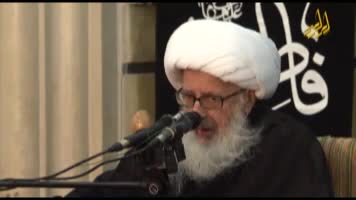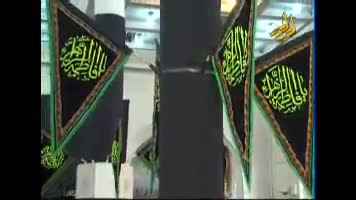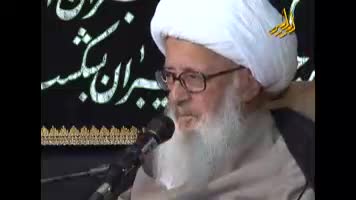it must be clarified what (people)
lie asleep within the Baqi graveyard.
and the ignorance that plagues us,
(might) be removed by the remembrance of this great personality and supreme sign (of God).
All praise belongs to Allah, the Lord of all the worlds, and may the salutation of God be upon our master Muhammad (P.B.U.H.) and his blessed and pure progeny, especially upon the Remainder of God on earth (A.J.). And may their enemies remain deprived of God's mercy till the day of judgement.
Because tonight is the night of the martyrdom of "He who cleaved open the sciences of the prophets" (A.S.),
it must be clarified what (people)
lie asleep within the Baqi graveyard.
and the ignorance that plagues us,
(might) be removed by the remembrance of this great personality and supreme sign (of God).
Sadooq, in the book I'lil and in the book A'yoon,
narrates this tradition from the Sixth Imam (A.S.):
"Whenever one of you performs the Hajj pilgrimage, (then) indeed he must end (it) by visiting us"
later he (the Imam) explains this commandment.
The Fiqh (laws) of Hadith and the Dirayah (comprehension) of Hadith is very important.
"Whenever one of you performs the Hajj pilgrimage,
(then) indeed he must end (it) by visiting us"
If the Imam (A.S.) employs emphasis within a sentence,
researchers must focus upon this critical point (the emphasis used by the Imam)
The Laam of emphasis, the imperative Laam, "indeed he must end (it)…"
Laam, this matter is an imperative matter.
As for the ancillary linkage (between this matter) and the Hajj pilgrimage,
the result will be such:
That (pilgrimage) does not reach completion without the performance of this highly recommended ancillary act,
the completion of the Hajj pilgrimage is achieved through a visitation to the (gravesites) of the Imams in the Baqi graveyard.
From here we must understand the importance of what exists within the Baqi graveyard.
"Whenever one of you performs the Hajj pilgrimage, (then) indeed he must end (it) by visiting us".
After this, (an explanation of the) cause of this (emphasis created) via the emphatic Laam is this:
(This emphasis has been incorporated) because visiting us represent the zenith of one's pilgrimage to the house of God.
The sematic indication within this tradition will be this:
The Hajj pilgrimage, without a visitation to the Baqi graveyard and humility in front of these four tombs,
remains incomplete.
and an incomplete (thing or matter) never bears fruit.
That which bears fruit is the completion of an act.
"Because visiting us is the zenith of the Hajj pilgrimage",
A visitation (to the gravesites) of these four individuals is the final part of the cumulative pre-requisite that makes up the Hajj pilgrimage.
A Hajj that, in reality, a comprehension of the greatness of that Hajj pilgrimage is beyond the reach of most people.
The tradition that I shall now narrate
is a tradition that bears an authentic chain of transmission upon, (it starts) from Sheikh Toosi
(goes back) to Safwaan, (then) to Ibn Abi Umair, until finally it reaches Muawiyah ibn Ammar
and Muawiyah ibn Ammar (narrates) from Jaffar ibn Muhammad (A.S.)
and that Hazrat (A.S.) narrates from his fathers (A.S.) up until the Holy Prophet of God (P.B.U.H.).
This tradition, apart from that it possesses an authentic chain of transmission,
(its narrators) also include two personalities about whom
"there exists a consensus amongst the (scholarly) group in accepting as authentic that which they have deemed as being so".
One (of these two) is Safwaan and the other is Ibn Abi Umair.
The tradition narrated by the Hazrat (A.S.) from his father
explains the importance of the subject in question:
"A man came to the Prophet of God (P.B.U.H.) and said:
O' Prophet of God, I had prepared myself for the Hajj pilgrimage
but was unable to perform the said act.
I am a rich person, I own a large quantity of wealth,
I have come here to ask what I should do
to compensate for the opportunity that I lost?"
Pay great attention herein,
such a tradition with such a chain of transmission,
with such a subject matter.
After he had asked this question, the Seal of the prophets (P.B.U.H.) said:
"Look at this mountain",
(the Prophet) looked at the Abi Qais mountain and said:
"If this mountain turns to red gold,
and you give it all away in alms for the sake of Allah,
still your act would not have come close to the value of one Hajj pilgrimage".
This statement of the Prophet (P.B.U.H.) says volumes about many a matter.
Sending one's wealth in charity for the sake of God is so greatly importance that
it is said within the text of the Quran:
Those who spend their wealth for the sake of God
"is as the parable of a grain growing seven ears (with) a hundred grains in every ear" (Al-Baqara:261)
Neverthess, if the mountain of Abi Qais turns to gold
and is given away in charity, it would still fail to fill in the empty space created by the absence of one Hajj pilgrimage.
Once the tradition, with all its length, comes to a close, (the Prophet) says:
How could it ever be possible for you
to replace a Hajj pilgrimage to the house of God with another act?
Herein, that which baffles the mind is this:
The Hajj pilgrimage holds such extraordinary greatness, but
unless the cause reaches its completion, the effect can not come into being;
every antecedent, unless it reaches its perfection, can not create any consequence.
The final part of this cumulative cause that
brings about the completion of the Hajj with all its splendor,
and stimulates this tree of purity to bear friut,
that final part lies asleep with the Baqi graveyard.
That is the greatness of that piece of land.
Minds should not become prisoners of the eyes.
When people go to the court of these Imams,
at what point do they take off their shoes (in respect).
It is a matter of great shame that in a place wherein
these four individuals lie asleep,
each one of them being a pillar of existence,
four individuals who are the foundations of all kingdoms,
(who are) the gateways of faith,
(who are) the trustees of the Most Beneficent,
(who are) the witnesses of the mortal world,
(who are) the interceders of the eternal realm,
(who are) the protectors of the treasures of God
(who are) the treasure troves of the secrets of God.
These four individuals are the holders of all of God's treasures,
These four individuals are the carriers of God's heaven.
This is why visiting these four individuals constitutes the completion of the Hajj and a perfection of one's visit to the house of God.
That house, with a greatness that
"The Glorified One made it a banner for Islam,
and a sanctuary for those seeking refuge,
and made its visitation obligatory,
and made (the dispensation of) its rights compulsary,
and decreed upon them its pilgrimage".
(A pilgrimage to such a house) must reach completion and perfection through a visitation to these four individuals.
Kulayni in the book Al-Kaafi, Sheikh-ut-Taifa in the book Tahzeeb,
Sheikh-ul-Mohaditheen Sadooq in the book La Yahzur,
Ibn Quluwiyeh in the book Mizaar,
these four (scholars who represent the) principle pillars of narrated traditions, have all narrated this particular tradition.
An exposition of this tradition shall be provided on some other occasion, God willing.
The Holy Prophet of God (P.B.U.H.) said to his grandson Imam Hasan (A.S.):
I shall present the essence of this tradition in a short summarized form,
this is the first personality who lies asleep herein. He (P.B.U.H.) said to his grandson:
Please pay great attention to this sentence,
"He who visits you as a pilgrim…"
in reality, the words used herein by the Seal of the prophets (P.B.U.H.) are such that they break a person's back,
"He who visits you as a pilgrim, has a right over me (I am indebted to him)".
The words are these: "(He) has a right over me"
A person who is such that all of existence, all of the prophets, are indebted to him
has said such a sentence:
"He who visit you (Hasan) as a pilgrim, has a right over me (the Prophet, and I am in his debt)".
Hasan ibn Ali (A.S.) is such a personality.
This is the first person whose grave is visited there.
Here we understand why (such a visitation) represents the completion of the Hajj pilgrimage.
He (P.B.U.H.) said: "He has a right over me (I am in his debt)",
What is this right?
The right is this that on the Day of Judgement, I myself will go to visit him,
This is the reality of the Baqi graveyard.
A pilgrim to that site is such that the Seal of the prophets (P.B.U.H.) visits him as a pilgrim.
Someone who goes there as a pilgrim,
the supreme intellect of existence (P.B.U.H.) visits him as a pilgrim on the Day of Judgement.
This too is merely a summary.
This statement is strange
A summary of the text is this:
Inpure metal is passed through a purifying furnace,
when the impurity is seperated
pure gold comes out of the said furnace.
After saying that it is my duty to visit him, he (P.B.U.H.)m said:
"On the Day of Judgement, I shall purify him of his sins in a manner
that I shall extract him from the furnace,
and shall send him to a place
that it is not clear what his position will be (i.e. this position is so great that one lacks the words to explain it)".
In that place lies a second personality,
the owner of the Psalms of the progeny of Muhammad (P.B.U.H.).
He is someone who shall be addressed by God on the Day of Judgement as "The Beauty of All Worshippers" (A.S.)
(Another person) who lies asleep therein is a person whose martyrdom occurred tonight.
He is a person that about him the Seal of the prophets (P.B.U.H.) said:
and this sentence is enough for anyone who possess the capacity (of comprehension)
(He said): "His name is my name, and his character is my character".
This is Baqir-ul-Uloom (A.S.).
Afterall, you people are knowledgable people, you are people of insight and recognition,
the effect of these sermons and lectures is that
you develop a deeper understanding of God.
The path to God is (through) these fourteen individuals,
and this number is neither reduced nor increased, (and) this is vitally important.
But where can one find recognition? (its no where to be found)
It is possible that the people who stand therein (in the Baqi graveyard)
argue that if you pilgrims to the house of God
take off your shoes,
(this act of yours would be) contradictory to the principles of hygiene.
It is possible that they say this, but there answer is this
they themselves wanted to extinguish the light of God
but God willed otherwise.
The grave of the great great grandchild of the Fifth Imam (A.S.) was found.
All the strength of the (Saudi) government became focused on that spot
so that this sun could be kept behind a veil of clouds
but because God intended (it to be known), it became known.
and its news reached everywhere.
After approximately a thousand years, the grave of the great great granchild of the Fifth Imam (A.S.) (became apparent)
that too, a non-immaculate descendent of the immaculate Imam.
When the grave was opened, sweet aroma filled the air and human senses were overwhelmed,
the body was (fresh) like a newly blossomed flower.
There all the forces of nature were neutralized.
But where can one find recognition? (its no where to be found)
This is something that occurred only a few years ago.
This great jurisprudent who lies herein, Ayatullah Brujerdi,
this man could read the most minute written texts even in his old age.
once he narrated his own story, he said:
"Pain inflicted my eye,
and no treatment had any effect,
(so) I went on pilgrimage to the tombs of the saints in Iraq,
When I reached Basra I caught a train.
In the place where I caught this train,
pilgrims who were on foot and had intended to visit the gravesite of Syed-us-Shuhada (A.S.) also came onto this train.
One of them was asleep.
I took a little mud from in between the toes of this man's foot,
and rubbed it onto my ailing eyes.
The very moment I rubbed this mud into my eyes
the pain went away and to this year I have never needed spectacles".
This was the recognition held by a most learned jurist.
When they lack the recognition
to understand that the mud and the earth from the feet of a pilgrim who visits the gravesites of this family, the earth from the feet of pilgrim who visits their graves
is a cure for untreatable ailments,
then (as a result, they argue that) pilgrims going barefoot into the Baqi Graveyard is contradictory to the principles of hygiene.
Even if you do not possess the recognition enjoyed by this man of knowledge (Ayatullah Brujerdi),
(even then) leave on your socks but take off your shoes.
Do you know what goes on therein?
That place is a place (about which it is said): "That (shall be so); and whoever respects the signs of Allah" (Al-Hajj:32)
These four graves represent undoubtable instances of these "signs of Allah".
Paying respect to these four graves is a symbol of one's virtue and piety.
Those who go barefoot to the Baqi graveyard
the piety of their hearts is personified by their actions.
The people of knowledge should act so as to rouse the ignorant ones from their slumber,
(so that they too) respect the honor of the Baqi graveyard.
Do not look upon those ruined graves (do not let your mind be fooled by their apparent situation),
everyone must go there barefoot
so that you blind the eyes of the people who wanted to eliminate these gravesite.
It must be clarified that the greatness (of this place) is such
heads and feet are indistinguishable within this sanctum. (i.e. all who enter therein are equal as servants in front of the greatness of those buried there)
O' fifth Imam (A.S.), O' you asleep within that ruined grave
you are the one who, like the supreme intellect and the seal of the prophets (P.B.U.H.),
said to Jabir ibn Abdullah Ansari:
"Give my salutations to the one who shall cleave upon the sciences of the prophets"
O' people of knowledge, pay great attention.
The word "An-Nabiyeen" is a plural form that incorporates the instrument "Al".
What are the sciences of the prophets?
Read the Quran:
"And when your Lord said to the angels,
am going to place in the earth a vicegerent
they said: What! wilt Thou place in it such as shall make mischief in it
and shed blood
and we celebrate Thy praise
and extol Thy holiness? He said:
Surely I know what you do not know.
And He taught Adam all the names" (Al-Baqara:30-31)
This is the knowledge of one man, this is the knowledge of one prophet.
"And He taught Adam all the names"
Now, what existed within the chest of the prophet Nuh (A.S.)?
(and) what existed within the heart of Musa ibn Imraan (A.S) with his knowledge of the "nine clear signs"?
(and) what existed within the soul of Isa ibn Maryam (A.S.) with his knowledge of the "great name"?
"and I heal the blind and the leprous,
and bring the dead to life with Allah's permission" (Aal-i-Imraan:49), what is the story herein?
(and) then what exists within the infinite ocean of the heart of the supreme intellect (P.B.U.H.)?
What is important is that the sunni and the shi'a, the great scholars from amongst them, have all narrated:
"He who shall cleave open all of these sciences
is Muhammad ibn Ali Al-Baqir (A.S.)"
This is his rank, (this is) his position. (He cleaved open) all the sciences of all the prophets.
When Jabir had transmitted the Prophet's salutations to the Imam (A.S.), the Imam (A.S.) looked towards him and said:
"O' Jabir, carry out your will, carry out your will".
He asked, "What is the matter?"
(The Imam) wanted him to understand that he was kept alive only so as to
convey those salutations to me (the Imam).
Then he (The Imam) said: "By God, by God,
that which has occurred, and that which willl occur till the Day of Judgement,
I know it all".
This is the person who lies asleep in the Baqi graveyard.
Abu Baseer was in Kufa,
there he used to teach the Quran to a woman,
and sometimes he would joke with her.
Days passed, and he decided to travel.
He came to Medina and visited the Imam (A.S.)
The moment the Imam (A.S.) saw Abu Baseer, he said:
"What did you say to that woman in that house in Kufa?"
Abu Baseer reports: "I covered my face with shame"
He (the Imam) said: "Do not return (to that state of affairs)".
Someone who is in Medina,
(and) in Kufa a joke is exchanged in private between a man and a woman,
and (even this private matter) is not hidden from his perception. This is the person who lies asleep in the Baqi graveyard.
In summary of our discource, anyone who goes there must understand,
"Therefore put off your shoes;
surely you are in the sacred valley, Tuwa" (Taa-Haa:12)



